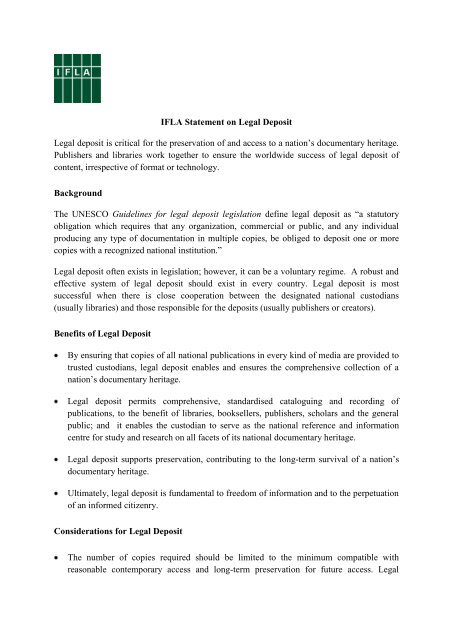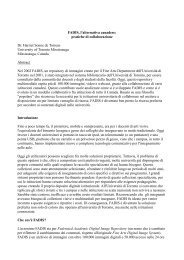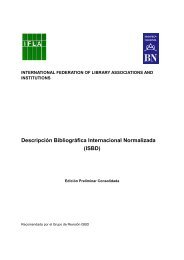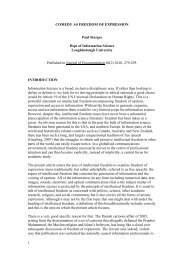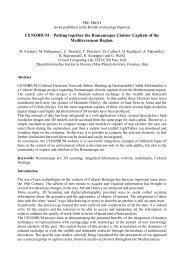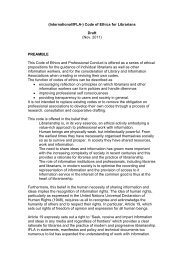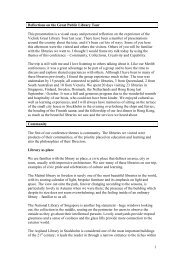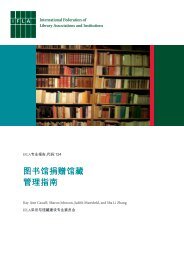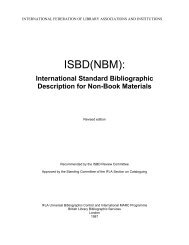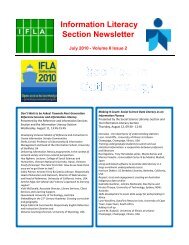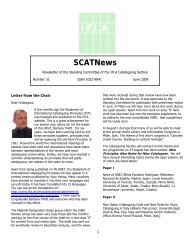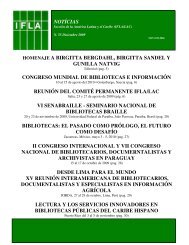English - IFLA
English - IFLA
English - IFLA
You also want an ePaper? Increase the reach of your titles
YUMPU automatically turns print PDFs into web optimized ePapers that Google loves.
<strong>IFLA</strong> Statement on Legal Deposit<br />
Legal deposit is critical for the preservation of and access to a nation’s documentary heritage.<br />
Publishers and libraries work together to ensure the worldwide success of legal deposit of<br />
content, irrespective of format or technology.<br />
Background<br />
The UNESCO Guidelines for legal deposit legislation define legal deposit as “a statutory<br />
obligation which requires that any organization, commercial or public, and any individual<br />
producing any type of documentation in multiple copies, be obliged to deposit one or more<br />
copies with a recognized national institution.”<br />
Legal deposit often exists in legislation; however, it can be a voluntary regime. A robust and<br />
effective system of legal deposit should exist in every country. Legal deposit is most<br />
successful when there is close cooperation between the designated national custodians<br />
(usually libraries) and those responsible for the deposits (usually publishers or creators).<br />
Benefits of Legal Deposit<br />
By ensuring that copies of all national publications in every kind of media are provided to<br />
trusted custodians, legal deposit enables and ensures the comprehensive collection of a<br />
nation’s documentary heritage.<br />
Legal deposit permits comprehensive, standardised cataloguing and recording of<br />
publications, to the benefit of libraries, booksellers, publishers, scholars and the general<br />
public; and it enables the custodian to serve as the national reference and information<br />
centre for study and research on all facets of its national documentary heritage.<br />
Legal deposit supports preservation, contributing to the long-term survival of a nation’s<br />
documentary heritage.<br />
Ultimately, legal deposit is fundamental to freedom of information and to the perpetuation<br />
of an informed citizenry.<br />
Considerations for Legal Deposit<br />
The number of copies required should be limited to the minimum compatible with<br />
reasonable contemporary access and long-term preservation for future access. Legal
deposit should not be used as a mechanism to provide a country’s libraries with gratis<br />
publications.<br />
The cost of depositing the material and the material itself should be borne by the<br />
depositor. In the case of digital publications, this includes any software or other access<br />
technologies required to make the publication comprehensible. To facilitate deposit of<br />
digital publications, special solutions and practical arrangements may be needed.<br />
Deposit should take place as soon as possible after publication.<br />
The custodian should ensure that the deposited materials are cared for and managed in a<br />
responsible and accountable manner.<br />
The custodian should ensure the preservation of the deposited material. This includes the<br />
copying or transcription of copyright protected materials to the extent essential for their<br />
preservation. Deposited material should be made available for use in a manner that does<br />
not unreasonably prejudice the interests of the copyright owner.<br />
As legal deposit is generally established in national legislation, implementation varies<br />
among countries. Seeking greater uniformity (e.g., with regard to number of deposit<br />
copies required) may not be feasible nor desirable. But in a world where information<br />
increasingly has no borders, it is an important principle both that deposit libraries should<br />
be able to make legal deposit copies accessible in the same manner as they do other<br />
collections, and that publishers should not be subject to unreasonable demands and can<br />
meet legal deposit requirements without undue complexity and burden.<br />
User Generated Content<br />
Electronic publications are a major and integral component of a nation’s documentary<br />
heritage, and therefore must be included in legal deposit arrangements, including content<br />
produced and shared by Internet users. Digital technologies provide opportunities for<br />
facilitating legal deposit through rapid transmission, and better enabling the complex tasks of<br />
cataloguing, indexing and recording, managing, and providing access to deposited material.<br />
However, as the Internet widens the possibilities for all users to publish content online,<br />
comprehensiveness may not be possible for such publications; instead representative<br />
selections would fulfill this requirement. Digital technology also creates new concerns about<br />
unauthorized alteration, copying and dissemination of deposited material. Publishers and<br />
librarians must work together to ensure that the legitimate needs of both users and owners of<br />
deposited materials are accommodated in this evolving environment.<br />
Endorsed by the Governing Board of <strong>IFLA</strong>, at its meeting in Den Haag, The Netherlands,<br />
07th December 2011.


